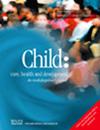Exploring Early Childhood Development Interventions for Building Human Capital in Sub-Saharan Africa: A Scoping Review
Abstract
Background
Inequalities in the provision and implementation of early childhood development (ECD) interventions in Sub-Saharan Africa remain a challenge. This scoping review aimed to investigate the types and extent of ECD interventions in this region, using the Nurturing Care framework (NCF).
Methods
This review included randomised controlled trial (RCT) studies related to ECD interventions in Sub-Saharan Africa. Sources from 2019 to 2024 were included. PubMed, MEDLINE (Ebsco), Web of Science, ProQuest and PsychInfo were searched in September 2024. Abstracts and full texts were reviewed using Rayyan.
Results
Of 85 studies retrieved, 21 conducted across 13 countries were included in our review. Most were conducted in Eastern and Southern Africa, with Western and Central Africa notably underrepresented. Sample sizes varied from 134 to over 9000 participants. ECD interventions targeting children from 0 to 8 years old were included. Nutrition-focused interventions were the most common (n = 9) and showed the biggest positive impact on child weight and growth. Responsive caring interventions were the second most common (n = 2), resulting in fewer reports of maltreatment, reduced endorsement of corporal punishment and fewer behavioural problems in children. The remaining three NCF dimensions (i.e., early learning opportunities, safety and security, and good health) each had only one intervention focusing solely on that dimension and showed mixed results on child development. Multidimensional interventions were common, with seven studies combining multiple ECD support elements to create a holistic approach. Although these interventions showed mixed results, they were more likely to report positive outcomes across multiple NCF domains compared to single-focus interventions.
Conclusions
Most interventions focus only on a couple of NCF elements. There is a need for increased focus on underrepresented regions to address local ECD needs effectively and to develop and evaluate interventions that incorporate all elements of NCF in African contexts.


 求助内容:
求助内容: 应助结果提醒方式:
应助结果提醒方式:


